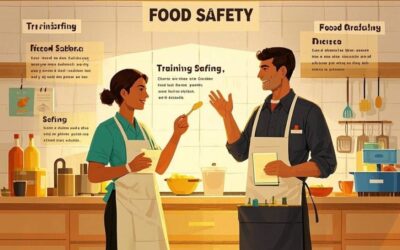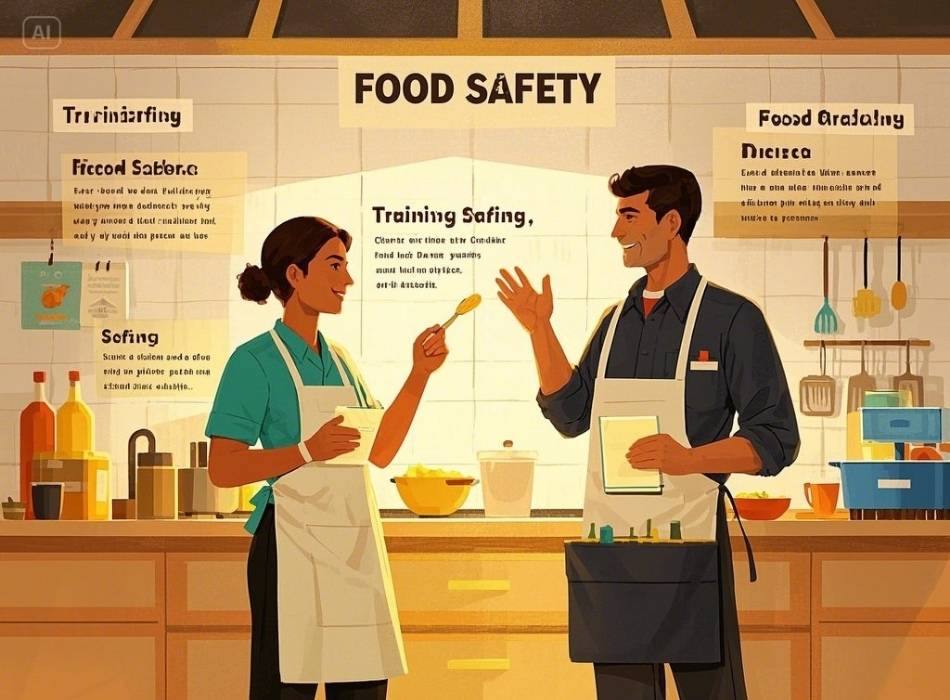Food safety isn’t just a box to check; it’s the pillar that upholds consumer trust and ensures public health. Behind the scenes, a pivotal figure shoulders the responsibility of safeguarding the reputation of food businesses and keeping the industry accountable. Enter the Food Safety and Training Director.
If you’re a food industry professional, restaurant owner, or safety manager, understanding the role of a Food Safety and Training Director can provide valuable insights into maintaining compliance, minimizing risks, and creating a safety culture within your organization. This blog explores what a Food Safety and Training Director does, why their role is crucial, and the qualities that make them effective in steering a food business toward excellence.
A Deep Dive into the Food Safety and Training Director Role
A Food Safety and Training Director is a senior-level professional overseeing all food safety practices and employee training within an organization. Their job goes beyond ensuring safe food practices; they also foster a culture of safety, compliance, and continuous improvement.
Key Responsibilities: Developing Food Safety Protocols:
The Food Safety and Training Director creates and implements customized safety protocols in compliance with local, national, and international regulations, such as the FDA’s Food Safety Modernization Act or HACCP (Hazard Analysis and Critical Control Points) guidelines.

Training Programs:
They design and deliver effective employee training programs tailored to various organizational roles. Every team member, from kitchen staff to managerial personnel, must understand food safety principles and how to apply them daily.
Supplier and Vendor Auditing:
Working with suppliers is an integral part of the food industry. Directors audit suppliers and vendors to ensure that raw materials meet safety standards before entering the business’s supply chain.
On-Site Inspections and Monitoring:
Their remit includes rigorous inspections of food preparation areas, equipment, and storage facilities. Directors flag potential risks or violations and implement immediate corrective actions while setting up preventive controls.
Crisis Management:
When food safety incidents, such as contamination or outbreaks, occur, Food Safety Directors take charge. They lead investigations to identify root causes, resolve issues promptly, and ensure clear communication within and outside the organization.
Data Analytics and Reporting:
Directors monitor safety audits, employee feedback, and compliance data, turning insights into strategic decisions that help reduce risks and boost operational efficiencies.
Compliance with Certifications and Standards:

They ensure their organization meets and maintains food safety certifications like ISO 22000, BRCGS Global Standard for Food Safety, or ServSafe. Compliance with these certifications enhances credibility and can be a key selling point for restaurant owners and food professionals. Additionally, food safety audits conducted by regulatory authorities ensure that the organization follows the standards and guidelines for food safety. It is essential to have a compliance management system that regularly reviews and updates processes to meet changing regulations and standards.
Employee Training and Feedback:
One of the most crucial aspects of maintaining food safety is ensuring proper employee training. From kitchen staff to servers, everyone involved in preparing or serving food must have a thorough understanding of food safety practices. Restaurants must also provide regular training sessions and refresher courses to update employees on new procedures, equipment, or regulations. Employee feedback is another essential aspect, as they are on the front lines and can provide valuable insights into potential risks or areas for improvement.
Proper Storage and Temperature Control:
Proper food storage is essential to prevent contamination and the growth of harmful bacteria. Restaurants should have designated storage areas for different types of food, such as raw meats, produce, and ready-to-eat items. These storage areas should be well-ventilated, clean, and maintained at the appropriate temperature.

Why This Role is Becoming Increasingly Crucial
With the rise of globalization, supply chains are more complex than ever. Simultaneously, foodborne illnesses are a persistent threat, with the CDC estimating 48 million cases annually in the U.S. alone. These shifts highlight the pressing need for specialized food safety leadership to mitigate risks and maintain compliance levels.
Qualities of an Exceptional Food Safety and Training Director
To succeed in this role, professionals need more than technical know-how. Below are some essential qualities:
- Attention to Detail:
Food safety hinges on consistency. A keen eye for detail ensures no aspect of safety protocols is overlooked, from proper storage temperatures to traceability during recalls. - Strong Communication Skills:
Conveying complex food safety concepts in a relatable, actionable manner is fundamental. Whether training staff or addressing executives, communication remains key. - Adaptability to Industry Trends:
The food industry evolves rapidly. An exceptional director stays ahead of trends like AI in supply chain monitoring or the growing demand for allergen-free products. - Data-Driven Decision-Making:
The ability to analyze safety reports and audits and draw insights from this data enables proactive interventions and helps optimize systems. - Collaborative Mindset:
Food safety doesn’t happen in silos. Directors must collaborate across departments, from procurement to marketing, aligning efforts toward a common goal. - Calm Under Pressure:
Food safety issues often arise unexpectedly. A calm, solutions-focused approach is crucial in effectively resolving crises without compromising public trust. - Continuous Learning:
The food safety landscape constantly evolves, introducing new regulations and technologies. Directors must stay up-to-date with industry trends and continuously seek opportunities for professional development to ensure their knowledge and skills remain relevant. - Effective Communication:
As leaders in food safety, directors must be effective communicators, from effectively training staff on protocols to communicating with regulatory agencies and the public during a crisis. Clear communication is crucial in maintaining trust and ensuring compliance with food safety standards. - Adaptability:
In the ever-changing world of food safety, directors must be adaptable to new challenges and able to pivot strategies quickly when necessary. This may include implementing new protocols, products, or technologies to address emerging food safety issues. - Collaboration:
Food safety directors must also be skilled collaborators, working closely with cross-functional teams and departments in quality assurance, research and development, and operations to ensure food safety protocols are correctly implemented throughout the supply chain. - Continuous Learning:
Directors in the field must stay current on the latest advancements in food safety. This includes attending conferences, workshops, and training sessions to gain knowledge and insights from industry experts. - Crisis Management:
In times of crisis, such as a food recall or contamination issue, food safety directors must be able to quickly and effectively respond with proper protocols to protect public health. This requires strong crisis management skills and the ability to communicate effectively with all stakeholders. - Collaboration:
Food safety is not solely the responsibility of one individual or department. Collaboration is essential for ensuring a safe supply chain, as it involves working closely with suppliers, regulators, and other departments within the company. - Technology Integration:
Advancements in technology have greatly improved food safety management. Food safety directors must stay updated on new technologies such as blockchain, traceability software, and real-time monitoring systems to implement them in their supply chain management.

How Food Safety and Training Directors Impact Key Business Functions
For Restaurant Owners: Enhanced Customer Trust: Customers will likely remain loyal to establishments prioritizing strict hygiene and food safety standards. Avoidance of Costly Audits and Fines: Proper food safety systems prevent legal backlash, minimize fines, and boost operational savings. For Food Industry Professionals: Career Advancement Opportunities: Training programs led by these directors equip teams with skills that make employees more valuable assets in the long term. More substantial Brand Reputation: Compliance certifications and superior safety records are essential for retailers and manufacturers operating in competitive industries. For Safety Managers: Streamlined Processes: Directors help safety managers by providing structured, scalable processes that better integrate compliance with daily operations. Proactive Problem Solving: Directors foster cultures where safety teams can spot risks before they escalate. Preparing for Future Challenges
The Food Safety and Training Director role is continuously evolving to address challenges like:
Climate Change Impacts: Changes in temperature and weather patterns can introduce new food production and storage risks. Modern Tech Integration: AI-driven tools and blockchain are becoming foundational components of the food safety landscape. Post-Pandemic Practices: COVID-19 heightened the need for stricter hygiene and training, and its ripple effects will shape food safety norms for years to come. Those stepping into or collaborating with this role should seek ongoing education. Certifications like HACCP, SQF Practitioner, or ISO training remain indispensable for meeting new challenges head-on.
Take the First Step in Raising Your Food Safety Standards
Food safety isn’t optional. It’s the lifeline of every successful food-related business. By hiring or upskilling a Food Safety and Training Director, you ensure that your organization survives and thrives in a competitive, highly regulated landscape.
If you’re interested in refining your food safety practices or need expert guidance on implementing training standards across your business, contact industry experts or explore specialized consultancy services designed for the food service sector. It all starts by prioritizing safety and making it central to everything you do.
Conclusion
Food safety is not just a regulatory requirement but a critical component of building trust, ensuring quality, and achieving long-term success in the food service industry. By investing in proper training, implementing robust safety protocols, and fostering a culture of accountability, your organization can set itself apart as a leader in the field. Remember, the foundation of excellence lies in your commitment to safety and continuous improvement. Take the first step today and pave the way for a safer and more prosperous future.



















